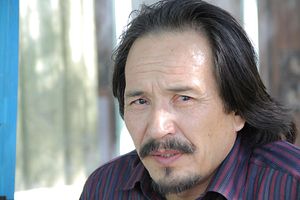Does life imitate art or art imitate life? In the case of Qurban Ali Mirzaee it seems to be a case of the former. A veteran of more than one-hundred films, the fifty-year old Afghan actor is witnessing the same kind of dramatic events in his life that his characters usually endure in his plays and films. Life has taken a sudden turn for this Hazara film maker, who has made more than 150 short films, acted in at least 200 TV series, and directed many plays. Baba Mazari, as he is popularly known in Afghanistan, has had to flee with his family and some members of his theater group to India, after being threatened by insurgents. He now lives the life of a refugee in a small, congested apartment, struggling to fulfill the basic needs of life.
In an interview with The Diplomat, Mirzaee says: “I had never expected that my life would change like this. I was busy doing what I used to enjoy. People used to like my performances and creations and I was a popular name in my own community and with the larger Afghan audience. But I’ve lost everything. I am living in poverty.”
Ever since Mirzaee arrived in India last November, he has been struggling to find employment. He is looking for opportunities to perform in Delhi, trying to establish contact with different theater groups and artists. He is also trying to keep the Simorgh Film Association, the theater group with which he was associated, alive in Delhi.
In 2008 and 2010, along with other members of his theater groups, Mirzaee came to Delhi to perform in the National Theater Festival. The play he performed—Salsal and Shahmama—tells the tragic story of the demolition of the Bamiyan Buddha statues at the hands of the Taliban. It is believed that these statues, after which the play is named, symbolized the ancestry of the Hazara people.
The Simorgh Film Association has been one of the most progressive theater movements in Afghanistan. Not only has it been bold in the themes it portrayed, but also because it featured women in its plays.
“There were seven women in my theater company. We never hesitated in presenting the issue of terrorism, religious fundamentalism, or female emancipation in our plays. I think we’re paying the price for this boldness,” says the veteran artist, who was interviewed with his daughter, who is also a scriptwriter and performer, present.
Before Mirzaee’s life took a dramatic turn, he was a popular performer at the Kabul-based TV station, Negah TV. His acting and plays were very popular among ordinary Afghans, but were not to the liking of the country’s religious extremist forces.
Last July, he was kidnapped from his office and taken to an unknown location, where he was kept for several days and badly beaten. Somehow he managed to escape. Despite this, he continued with his performances. However, he was threatened by the Taliban again, and was given an ultimatum: leave the country or die. Mirzaee chose to flee Kabul with his family, leaving behind everything they owned. Even since, Mirzaee has been looking for opportunities to work, but like so many other Afghan refugees in India, he is struggling to survive.
He is hoping that the United Nations High Commissioner for Refugees (UNHCR) in Delhi would help his family in gaining refugee status in a developed country. “It’s been painful to leave my motherland, which has given me so much. If given an opportunity, I would like to go back to Kabul. But certain death awaits me there and I don’t want my family to suffer,” says the Hazara artist.
He adds that the “situation in Afghanistan is so volatile and uncertain that no one knows what will happen tomorrow. In the absence of a strong government, the Taliban and other extremist forces have gotten a new lease of life.”
Delhi has become a refuge for many Afghans escaping persecution in their homeland. According to one estimate, there are more than 20,000 Afghans living in the Indian capital. But in the absence of proper job opportunities, most of them are living in abject poverty, with some resorting to crimes such as drug dealing.
Mirzaee and his family do not know what future awaits them. Their immediate concern, however, is survival. With their savings drying up fast, they are in desperate need of support. None seems forthcoming.
“It pains us to sit idle like this. It pains me to see my father going from place to place asking for help. This is really a huge crisis for us,” say his daughter, Rehala, 24, who acts as a translator for her father.
Mirzaee’s life has become a tragedy. A man who not long ago was a popular TV personality does not have enough money to buy a television set now.

































